On October 26, 1954, a young Muslim Brother by the name of Mahmoud Abdel-Latif attempted to assassinate Gamal Abdel-Nasser (below), the prime minister of Egypt. That attempt prompted a massive crackdown against the powerful Muslim Brotherhood. Now, six decades later, there is a sense of déjà vu, because the current Egyptian government is again determined to eliminate the Brotherhood as an organization, even after one of its members had been elected president, Mohamed Morsi. Morsi was overthrown in July of last year by the military amidst protests and calls for Morsi to step down.
When an assassin fired at him in 1954, Nasser was speaking at Manshiya Square in the Mediterranean city of Alexandria to celebrate the signing of a new treaty with Britain, one which he said would usher in a new era of independence and national sovereignty for his country. The British occupation of Egypt, which had begun in 1882, had still not ended, since British troops continued to occupy the Suez Canal zone.
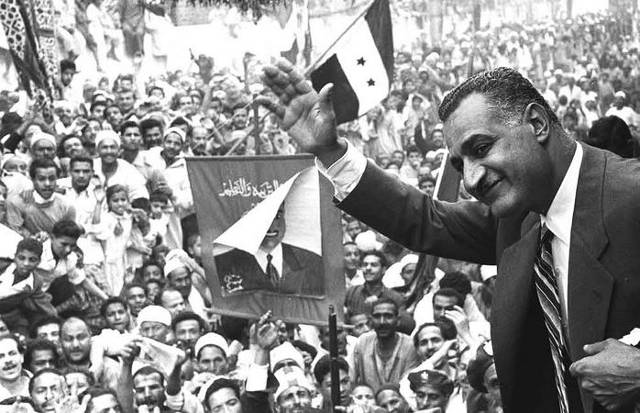
Nasser, who did not become Egypt’s official head of state until 1956, came to power in 1952 as part of a military junta known as the “Free Officers.” The Free Officers staked their credibility almost entirely on their ability to assert Egypt’s national aspirations, so a changed relationship with Britain was essential to the survival of the regime. After long negotiations, Nasser was only able to extract a promise of phased troop withdrawal according to a seven year timetable, not an immediate withdrawal.
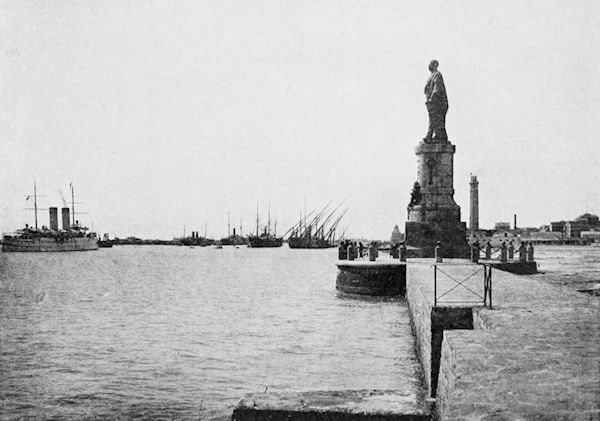
Founded in 1928, the Muslim Brotherhood is an organization that fuses religion and politics, but it also has had a long history of nationalism and anti-colonial activism. In early 1950’s, the group was locked in a protracted political struggle with Egypt’s military government, which was seeking to eliminate its political opponents one by one. From the perspective of many in the Brotherhood, Nasser’s concessions to the British provided an opportunity to move against him.
Nasser’s speech during the failed assassination attempt was soon broadcast by radio throughout the Arab world. In the recording, a series of shots are heard, but Nasser hardly pauses, and his speech becomes ever more impassioned: “O free men, let them kill me where I stand!” Nasser’s response to this attempt on his life displayed his charisma to the public for the first time. This charismatic style of leadership later became a signature of his presidency.
It is not clear who actually ordered the assassination attempt, but the vengeance taken upon the Brotherhood was swift and harsh. The Muslim Brotherhood was banned, and over 1,000 members were arrested. A small number of these were executed. The Brotherhood was portrayed as a conspiratorial group working on behalf of a range of mutually incompatible interests: the British, the Zionists, the deposed Egyptian king, and even the communists. The movement went underground and re-built itself over the course of many decades.
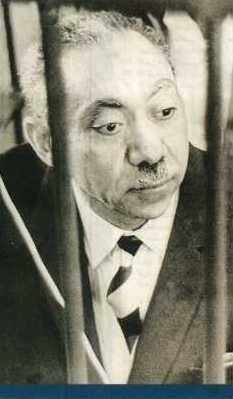
Even in the years prior to the Arab Spring, the Brotherhood had re-emerged as a major political player, even though it was not officially legalized. Candidates connected to the group won 20% of the vote in 2005, despite widespread fraud. The Ikhwan – to use their Arabic name meaning “Brothers” – began to trumpet their acceptance of democratic norms and were involved in the Arab Spring protests at Tahrir Square in 2011 that brought down the presidency of Hosni Mubarak.
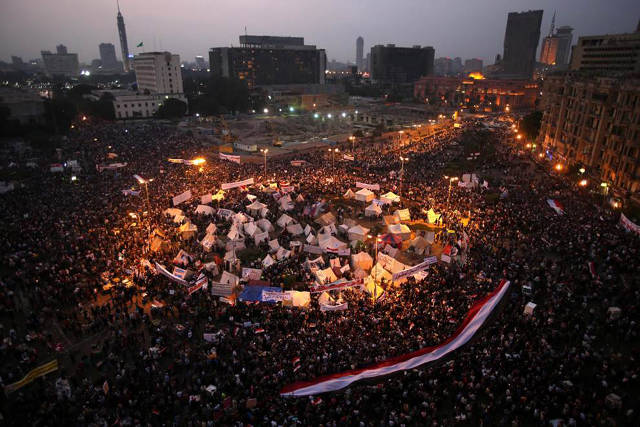
The Brotherhood did not spark these protest movements, but the group did benefit from the open atmosphere that prevailed after the overthrow the Mubarak regime. They founded a new party, the “Freedom and Justice Party,” which won the parliamentary elections of 2011-2012. Mohamed Morsi, a US-educated engineer and longstanding Muslim Brother, narrowly won the 2012 presidential election, but disappointed many by his apparent unwillingness to build a broad coalition with other political forces. He declared his decisions immune to judicial review, viewing the judiciary as a remnant of the old regime.
Morsi was removed from power on July 3, 2013 by Defense Minister Gen. Abdel-Fattah el-Sisi (below) in the face of massive protests against President Morsi. With Morsi’s overthrow, the Muslim Brotherhood was again declared illegal. Even the implicit toleration of the Mubarak era is a distant memory, as Sisi has labelled the Brotherhood a terrorist group for its opposition to Morsi’s overthrow. Morsi himself is now standing trial, accusing of killing protesters.
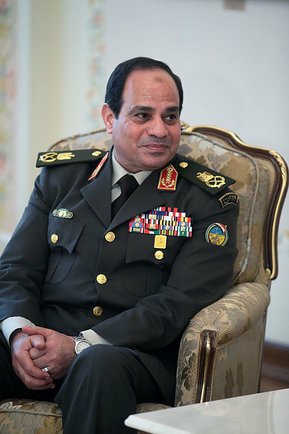
Sisi is viewed by many of his supporters as a charismatic figure whose personal leadership is a necessity. In this sense, Sisi, who was elected president this May in a disputed election, is an heir of Nasser. While there are political figures who directly claim the mantle of Nasser’s ideology, Nasserism itself was a shifting ideology based mainly on Egyptian nationalism and Nasser’s own charisma. It remains to be seen whether Sisi’s charisma will be equally potent and durable.
From the perspective of the Ikhwan, current repression is as traumatic as any in the past. The forcible break-up of pro-Morsi protests in Rabi‘a al-‘Adawiyya Square, which resulted in many casualties, will be hard to forget for the Brotherhood and partisans of Morsi. Just as in 1954, both sides have accused the other of cooperating with unsavory foreign powers.
As Nasser’s crackdown demonstrates, the group has long been accustomed to operating in the shadows. Even though Sisi seeks to fully dismantle the Brotherhood, it seems unlikely that he will succeed where Nasser did not.
